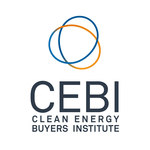Private Sector Energy Customer Companies Take Measurable Action to Decarbonize Industrial Commodities
The Clean Energy Buyers Institute illuminates energy customer company demand for low-carbon materials and resulting action to advance preferences in clean energy procurement processes
WASHINGTON–(BUSINESS WIRE)–As companies continue to demonstrate critical leadership during the clean energy transition, demand has grown for strategies that optimize carbon impact along supply chains, including industrial emissions that are particularly difficult to reduce. The Clean Energy Buyers Institute’s (CEBI) Decarbonizing Industrial Supply Chain Energy (DISC-e) program, which was launched earlier this year, has engaged with more than 300 companies to accelerate the market for low-carbon industrial commodities illustrated in today’s White House announcement boosting clean manufacturing across the U.S.
From the products we use every day to buildings where we work and play to the critical components of a clean energy future, corporate leaders are taking actions to accelerate the market for low-carbon materials and manufacturing by using their purchasing power and voice.
“Industries must prioritize and lead the change to decarbonization,” said Mark Porter, vice president, Transmission Acceleration Group at the Clean Energy Buyers Institute (CEBI) and Clean Energy Buyers Association (CEBA). “Now is the time for energy customers to leverage market demand to establish low-carbon norms by engaging other industry leaders along the supply chain to truly optimize emissions.”
Industrial materials are the building blocks of modern life; leading companies are preferencing low-carbon inputs for their products. Meanwhile, building materials are the largest source of industrial emissions; corporate leadership matters:
- Starbucks commits to reduce carbon emissions in its direct operations and supply chain 50% by 2030, including advancing measurement and reductions in embodied and lifecycle carbon for its equipment and building materials. Through the Greener Stores program, it has launched an open-source educational series in the Starbucks Global Academy, created in partnership with Arizona State University, with actions that can be taken to support reductions in carbon, water and waste – including sourcing sustainable materials.
- TK Elevator understands their responsibility to building owners, property managers and the riding public to create the safest and healthiest elevator systems possible. They have reduced scope 1 and 2 carbon emissions by nearly 15% in North America, and are moving aggressively toward a 100% renewable energy goal with a commitment to reduce greenhouse gas emissions from business activities by 53% by 2030 and are on track to achieve their zero-carbon future vision well ahead of their 2050 goal.
The clean energy future is being built now; companies are taking action to ensure it is even cleaner:
- Avangrid, a leading sustainable energy company, has committed to procuring, specifying or stocking 100% net zero steel by 2050 with an interim commitment of 50% by 2030. Domestically, this commitment is being implemented in their most recent requests for proposal (RFPs) for equipment procurement and construction (EPC) and balance of plant (BOP) contractors for their next tranche of projects entering operation before 2025.
- First Solar, an American solar technology company and the country’s largest manufacturer of photovoltaic (PV) solar panels, aims to reduce the carbon footprint of its ultra-low carbon solar panels by more than 65% by 2028 by going 100% renewable and engaging with key suppliers to minimize the embodied carbon of its solar panel components. The company’s products were the first PV panels in the Global Electronics Council’s (GEC) EPEAT registry for sustainable electronics, which will soon add an ultra-low carbon solar criterion to enable purchasers to identify solar panels with an ultra-low carbon footprint.
- Lightsource bp’s U. S. team was awarded a 2022 EPEAT ecolabel purchaser’s award by GEC for their commitment to and leadership in sustainability and low carbon procurement. As part of their procurement process, they prioritize sourcing renewable energy equipment and products from domestic sources, with an emphasis on those suppliers who are committed to tracking, reporting and reducing their greenhouse gas (GHG) emissions.
The DISC-e program engages leading energy industry organizations to raise awareness about the impact of embodied carbon emissions and provides tools for private sector companies, including the recently released Low-carbon Building Materials Procurement Principles and a suite of low-carbon solar educational materials.
The Industrials and Materials sectors are increasingly active in the Clean Energy Buyers Association’s State of the Market 2022, which looks at all corporate clean energy purchases. More than 42 U.S.-based companies joined the nearly 500 global companies in the sector that have committed to, or set, an approved science-based target through the Science-based Targets initiative (SBTi) demonstrating the prioritization of carbon-free energy as of April 2022.
About Clean Energy Buyers Institute
The Clean Energy Buyers Institute (CEBI) is a 501c3 public charity that solves the toughest market and policy barriers to achieve a carbon-free energy system. CEBI’s aspiration is to achieve a 90% carbon-free U.S. electricity system by 2030 and a global community of customers driving clean energy. Visit cebi.org for more information.
Contacts
Katie Boyer, katieb@inspireprgroup.com



